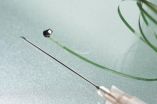(Press-News.org) Research commissioned by Cerebra, the charity that helps to improve the lives of children with brain conditions, and carried out by the Cerebra Research Unit (CRU) at the Peninsula College of Medicine & Dentistry, has found little evidence to suggest that cranial osteopathy is of benefit to children with cerebral palsy.
The research is published on-line in the Archives of Disease in Childhood.
Osteopathy has, over recent years, become a popular complementary treatment for children with cerebral palsy. Cerebra initially asked researchers at the CRU to investigate existing evidence regarding the benefits of osteopathy in this instance. The research team found no properly conducted scientific studies, with only one small study that showed some improvement after osteopathy therapy – but this had very few participants and the results were difficult to interpret.
The lack of existing evidence prompted Cerebra to ask the research team to carry out a large randomised control trial in order to provide families with good evidence about the effect of osteopathy for their children with cerebral palsy.
Before the trial was designed, the CRU research team talked in detail to parents and carers of children with cerebral palsy to discuss how they would like the study to be run. This degree of parental involvement in designing a trial is very unusual, but it ensured that the team designed a trial that was acceptable to families and that addressed the issues they wanted to be answered.
The researchers also interviewed osteopaths from the Foundation of Paediatric Osteopathy to find out more about the treatment and to help design the trial – the osteopaths who interacted with the research team agreed that the trial was a sensible test of the treatment.
In total, 142 children from the South West of England and Greater London were recruited to the trial for a six month period. Children were randomly allocated to either a treatment group or a control group: those in the control group were offered six sessions of osteopathy when they had completed the trial. This meant that the research team was able to compare a group of children who had received treatment with a group who had not, and that all children were offered the opportunity to have the treatment paid for by the trial.
Of the 142 children who were recruited into the trial, 133 (94 per cent) remained in the trial for the full six months.
The children were assessed 10 weeks and six months after they started the trial. The main results are those obtained at six months. The researchers found no statistically significant difference between the two groups in terms of a child's movement (which was assessed by physiotherapists who did not know if the child had received osteopathic treatment or not), the child's quality of life, the child's sleeping patterns and the child's level of pain. There was also no difference in the quality of life score for the parents and carers in either group.
The only difference identified by the research team was that 38 per cent of parents whose children had received osteopathy rated their children's overall wellbeing as better compared with 19 per cent of those who had not received osteopathy.
Professor Stuart Logan, Cerebra Professor of Paediatric Epidemiology, Director - Institute of Health Service Research and Director - PenCLAHRC, at the Peninsula College of Medicine & Dentistry, commented: "This has been a fantastic experience working so closely with Cerebra in designing and carrying out research which is of importance to their members. It was also a great opportunity to work with osteopaths who are committed to developing the evidence base around their work. None of this could have been done without the whole-hearted support of the families."
He added: "A properly conducted randomised controlled trial, such as this, is the only way to provide reliable, conclusive evidence on the effectiveness of any treatment. We hope that this evidence will be used to help parents and carers make informed decisions about treatment choices for their children. It can also give health professionals the information they need to be able to advise parents about treatments."
Chris Jones, Chief Executive at Cerebra added "It has been an extremely positive experience working with Professor Logan, and the Peninsula College of Medicine & Dentistry. Whilst we would obviously prefer to spend limited resources on finding and proving the positive benefits of any particular treatment – something that will directly improve the lives of children with Cerebral Palsy – it is also vitally important that we help children, parents and careres better understand what doesn't work as well as what does. Informed and educated decision making is critically important and we hope this research will play a significant part in empowering those people we are here to help."
Cerebral palsy affects approximately one in 400 children in the UK. Physiotherapy, occupational therapy, and speech and language therapy are often provided to support children with cerebral palsy. A number of complementary therapies claim to be beneficial.
INFORMATION: END
The first major study of the wellbeing and inclusion of former politically motivated prisoners in Northern Ireland will be launched by Queen's University today (Monday 14 March).
Ageing and Social Exclusion among Former Politically Motivated Prisoners in Northern Ireland and the border region of Ireland investigated the well being and social and economic inclusion of loyalist and republican former prisoners (aged 50 and over) as older people in Northern Ireland. The report will be launched at Parliament Buildings at Stormont this afternoon.
The research was led by ...
International climate negotiations are deadlocked between the affluent global North and "developing" South, between political Left and Right, and between believers and deniers. Now, authors writing in the latest issue of the International Journal of Water argue that a more integrative analysis of climate should help resolve these conflicts.
Land use changes and water management are highly relevant to climate change. To quote hydrologists Juraj Kohutiar and Michal Kravcik of the Slovak People and Water NGO: "Water evaporation is the most important agent of energy transformation ...
Potsdam/Bremerhaven, March 14th, 2011. Unusually low temperatures in the Arctic ozone layer have recently initiated massive ozone depletion. The Arctic appears to be heading for a record loss of this trace gas that protects the Earth's surface against ultraviolet radiation from the sun. This result has been found by measurements carried out by an international network of over 30 ozone sounding stations spread all over the Arctic and Subarctic and coordinated by the Potsdam Research Unit of the Alfred Wegener Institute for Polar and Marine Research in the Helmholtz Association ...
Calling it the "new periodic table for flies," researchers at North Carolina State University and collaborators across the globe have mapped the evolutionary history of flies, providing a framework for further comparative studies on the insects that comprise more than 10 percent of all life on Earth.
The research, published today in the online edition of Proceedings of the National Academy of Sciences, plugs gaps in the 260-million-year history of the fly order Diptera, says Dr. Brian Wiegmann, NC State professor of entomology and primary investigator of the fly tree ...
Electric cars are the future – a view shared by government and the automotive industry alike. The German federal government aims to establish Germany as the lead market for electromobility. By 2020, a million passenger cars with an electric drive should be on the roads in Germany. The prospects of achieving that aim look good: As the ADAC, the German motoring organization, found out in a survey, 74 percent of those surveyed would buy an electric car if they did not have to compromise in terms of cost, comfort and safety. Consumers are not willing to compromise one iota ...
Endoscopy has gone through amazing advancements in recent years. Microcameras on the tip of endoscopes supply images from the inside of the human body in ever higher resolution, which often makes it possible to identify tumors at an early stage. Endoscopes to date have some downsides, since they are expensive and, because of their multiple usages, have to be put through time-consuming and exhaustive cleaning procedures every time they are used. This problem might be solved by a new microcamera that the Fraunhofer Institute for Reliability and Microintegration (IZM) in Berlin, ...
The study analyzes the actions adopted by a dozen countries after suffering disasters similar to that of the Prestige, the oil tanker which sank off the coast of Galicia towards the end of 2002, provoking a spill of fuel-oil which turned out to be one of the biggest ecological disasters in the history of Spain. "We have seen that our country has not adopted technical nor legal preventative measures, as opposed to what happened in Germany with the shipwreck of the Pallas, for example, which produced a movement of a centralizing nature, in detriment to the federal spirit ...
Scientists at the National Institute of Allergy and Infectious Diseases (NIAID), part of the National Institutes of Health, have shown how the O157:H7 strain of Escherichia coli causes infection and thrives by manipulating the host immune response. The bacterium secretes a protein called NleH1 that directs the host immune enzyme IKK-beta to alter specific immune responses. This process not only helps the bacterium evade elimination by the immune system, it also works to prolong the survival of the infected host, enabling the bacterium to persist and ultimately spread to ...
Earthquakes are one of the world's biggest enigmas — impossible to predict and able to wreak untold damage within seconds. Now, a new tool from Tel Aviv University may be able to learn from earthquakes of the ancient past to better predict earthquakes of the future.
Prof. Shmuel Marco of Tel Aviv University's Department of Geophysics and Planetary Sciences in the Raymond and Beverly Sackler Faculty of Exact Sciences and his colleagues have invented a new tool which he describes as a "fossil seismograph," to help geophysicists and other researchers understand patterns ...
New research shows that the Wnt receptor Frizzled-9 (Fzd9) promotes bone formation, providing a potential new target for the treatment of osteoporosis. The study appears online on March 14 in The Journal of Cell Biology (www.jcb.org).
Adult bones are maintained by a balance of bone-forming osteoblasts and bone-resorbing osteoclasts. Although Wnt signaling affects this balance in mice and humans, the Wnt receptors involved remain unknown. A team of researchers led by Thorsten Schinke found that the Wnt receptor Fzd9 was upregulated during osteoblast differentiation and ...




